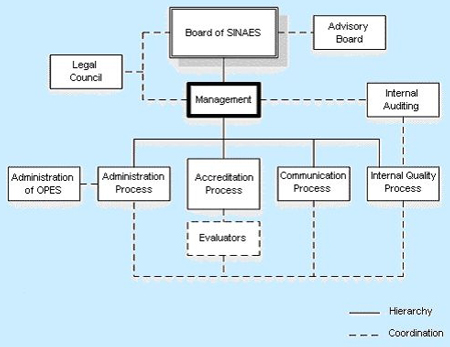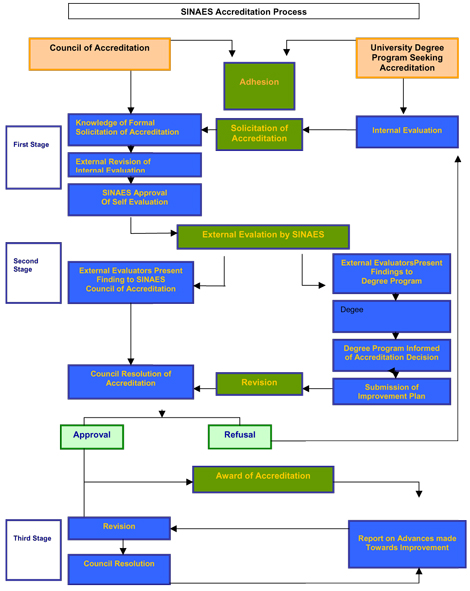Sistema Nacional de Acreditación de la Educación Superior [1] (SINAES)
Background
SINAES, the National Accreditation System for Higher Education, was formed in 1999 as part of an agreement between four public and four private Costa Rican universities seeking to mutually improve and monitor the quality of education offered at each institution. In May 2002, the country’s lawmakers, recognizing a need for greater oversight in the expanding field of higher education, passed legislative bill 8256 and officially recognized SINAES as the national accreditation body for tertiary education in Costa Rica. The organization is responsible for:
- Contributing to the achievement of academic excellence in all career programs
- Offering Costa Rican universities the opportunity to participate in a voluntarily accreditation process designed to ensure the public reputable and diverse options for higher education
- Certifying the quality of all career programs and guaranteeing that high standards are maintained throughout the process
- Recommending action to universities to strengthen weaknesses and solve problems detected through the accreditation process
- Cooperating with and participating in international academic and accreditation organizations
Organizational Structure
As dictated by bill 8526, SINAES operates under the auspices of the National Council of University Chancellors [2] (CONARE), an arm of the Ministry of Public Education [3] that oversees Costa Rican higher education. Within SINAES, management of the organization’s duties is handled by the National Council of Accreditation, which is staffed by leaders from the Costa Rican universities that work with SINAES and adhere to its policies.
 [4]
[4]Source: SINAES [5] Website
Accreditation Process
SINAES accredits degree programs rather than institutions. Accreditation in Costa Rica is a voluntary process. The accreditation process is as follows:
- Internal Evaluation: This is conducted by staff, current students and alumni from the university program seeking SINAES accreditation. Working in groups, they evaluate the institution’s standards or parameters of performance and produce a self-assessment report. According to SINAES, this self-assessment “should have characteristics that give faith of the formality and technical severity with which this process has been carried out.” In other words, the results should be valid and verifiable. SINAES hires outside education professionals to verify the accuracy and thoroughness of the internal evaluation.
- Request for Accreditation and Initial Analysis: Once the internal evaluation is complete, the report of self-assessment must be submitted to the National Council of Accreditation at SINAES. Members of the council decide whether or not the university program in question is eligible for the accreditation process and the next step in the process.
- External Evaluation: The external evaluation or “peer assessment” is conducted by a group of three educators contracted by SINAES, one native and two international and with experience in the field of accreditation. The group spends five days observing the academic department being evaluated, assessing the personnel, curriculum, students, infrastructure and administration. Upon completion of the five-day evaluation, the final findings are presented by the group to the National Council of Accreditation, the executive branch of SINAES.
- Award or Denial of Accreditation: Before the Council of Accreditation can make its final accreditation decision, officials from the degree program under review are consulted concerning the external evaluation. Based on this information, the institution will submit a program of self-improvement outlining ways to solve problems or weaknesses detected in both the internal and external assessments. If a degree program receives SINAES accreditation it is presented with official certification at a public ceremony.
- Reaccreditation and Continuing Oversight: Initial SINAES accreditation is valid for four years. Accredited programs must annually update SINAES officials on the progress being made concerning the self-improvement plan submitted during the accreditation process. After four years, degree programs undergo a reaccreditation process and, if certified, are recognized as accredited for eight years. For a list of SINAES accredited degree programs in Costa Rica see the links section below.
Diagram of the Evaluation Process
 [6]
[6]Source: SINAES [5] Website
Links to Additional Information
- SINAES [7] (Spanish)
- List of Costa Rican Institutions Working with SINAES [8] (Spanish)
- List of SINAES Accredited Programs Organized by University [9](Spanish)
- Ibero-American Network for the Accreditation of Quality in Higher Education: Costa Rica Page (Spanish)
- International Institute for Higher Education in Latin American and the Caribbean (IESALC): Report on Accreditation in Costa Rica [10] (Spanish)
